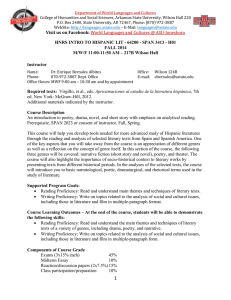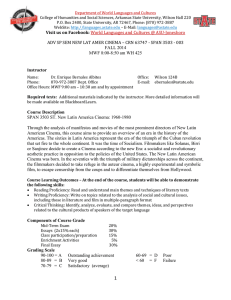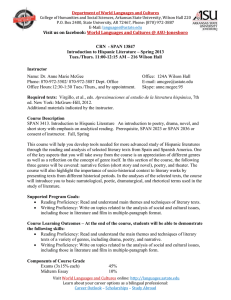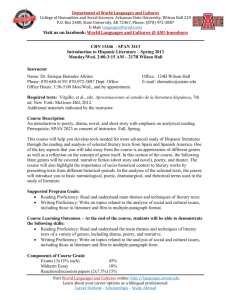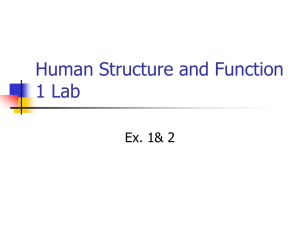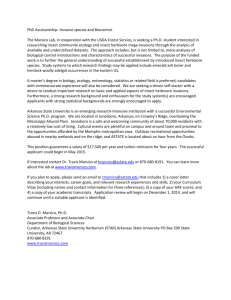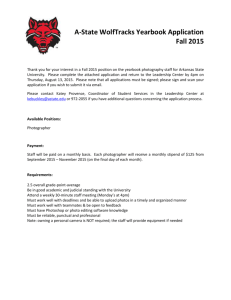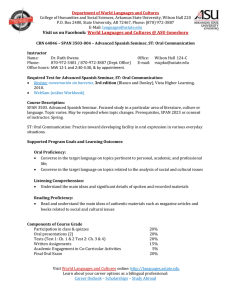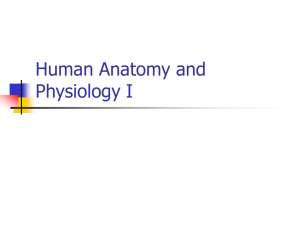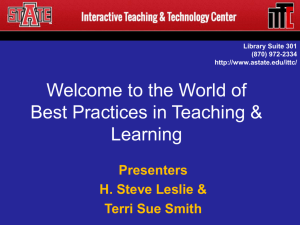College of Humanities and Social Sciences, Arkansas State
advertisement
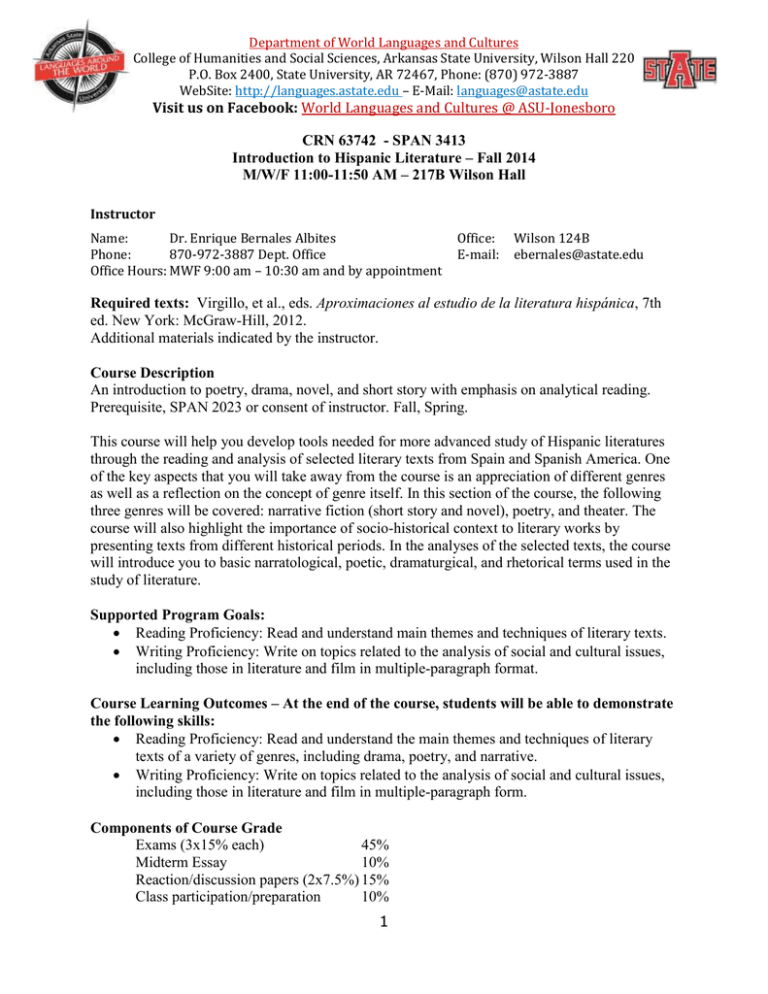
Department of World Languages and Cultures College of Humanities and Social Sciences, Arkansas State University, Wilson Hall 220 P.O. Box 2400, State University, AR 72467, Phone: (870) 972-3887 WebSite: http://languages.astate.edu – E-Mail: languages@astate.edu Visit us on Facebook: World Languages and Cultures @ ASU-Jonesboro CRN 63742 - SPAN 3413 Introduction to Hispanic Literature – Fall 2014 M/W/F 11:00-11:50 AM – 217B Wilson Hall Instructor Name: Dr. Enrique Bernales Albites Phone: 870-972-3887 Dept. Office Office Hours: MWF 9:00 am – 10:30 am and by appointment Office: E-mail: Wilson 124B ebernales@astate.edu Required texts: Virgillo, et al., eds. Aproximaciones al estudio de la literatura hispánica, 7th ed. New York: McGraw-Hill, 2012. Additional materials indicated by the instructor. Course Description An introduction to poetry, drama, novel, and short story with emphasis on analytical reading. Prerequisite, SPAN 2023 or consent of instructor. Fall, Spring. This course will help you develop tools needed for more advanced study of Hispanic literatures through the reading and analysis of selected literary texts from Spain and Spanish America. One of the key aspects that you will take away from the course is an appreciation of different genres as well as a reflection on the concept of genre itself. In this section of the course, the following three genres will be covered: narrative fiction (short story and novel), poetry, and theater. The course will also highlight the importance of socio-historical context to literary works by presenting texts from different historical periods. In the analyses of the selected texts, the course will introduce you to basic narratological, poetic, dramaturgical, and rhetorical terms used in the study of literature. Supported Program Goals: Reading Proficiency: Read and understand main themes and techniques of literary texts. Writing Proficiency: Write on topics related to the analysis of social and cultural issues, including those in literature and film in multiple-paragraph format. Course Learning Outcomes – At the end of the course, students will be able to demonstrate the following skills: Reading Proficiency: Read and understand the main themes and techniques of literary texts of a variety of genres, including drama, poetry, and narrative. Writing Proficiency: Write on topics related to the analysis of social and cultural issues, including those in literature and film in multiple-paragraph form. Components of Course Grade Exams (3x15% each) 45% Midterm Essay 10% Reaction/discussion papers (2x7.5%) 15% Class participation/preparation 10% 1 Department of World Languages and Cultures College of Humanities and Social Sciences, Arkansas State University, Wilson Hall 220 P.O. Box 2400, State University, AR 72467, Phone: (870) 972-3887 WebSite: http://languages.astate.edu – E-Mail: languages@astate.edu Visit us on Facebook: World Languages and Cultures @ ASU-Jonesboro Enrichment Activities 5% Final Essay 15% Grading Scale 90-100 = A Outstanding achievement 80-89 = B Very good 70-79 = C Satisfactory (average) 60-69 = D < 60 = F Poor Failure Description of Course Components Preparation and participation (10%): This is a discussion-oriented class and thorough preparation and active participation in class work (class discussion, pair/group work, and any additional activities assigned by the instructor) are crucial. All readings must be prepared for the date indicated in the schedule. For every new reading, you need to read the introductory sections (“Vida y obra” and “El autor y su contexto”) and prepare the Cuestionario. Only consistently active preparation and substantive contribution to class discussions (one that propels class discussions forward) will earn full points on participation. Every few weeks students will submit a self-evaluation of his/her participation in the course. This will form a part of the overall participation grade. More detailed information will be made available on BlackboardLearn. Reaction/Discussion papers (15%): Over the course of the semester, students will write 2 brief (1-2 pages) reaction papers related to the course readings of a particular day. The topic of these short compositions is open, but students should reflect on some aspect of the reading that interests them, and come prepared to discuss their paper in small groups. These papers will often serve as a source of class discussions. Exams (45%): The course will have an exam at the end of each unit. The exam format will be selected from identifications (of terms, historical and biographical information, textual details, citations, etc.), short answer questions, and essay questions. Should you miss one of these exams, you must contact me ASAP and present, within 48 hours, written, verifiable proof of an urgent reason (such as illness—a doctor’s note indicating an office visit on the day of the exam or an earlier visit with an indication of need to miss school on the date of the exam—or family emergency). Any make-up must be taken within 2 days of the in-class exam. Essays (25%): There will be two formal essays in this course. Specific topics for each essay will be posted on Blackboard Learn at least one week in advance. The first essay will be worth 10% of the final grade; the second essay will be worth 15 % of the final grade. Both papers must be typed, double-spaced, Times New Roman 12-pt. font, in Spanish. Electronic submissions will not be accepted. Both papers will be graded on: a) the quality of presented ideas: relevant, specific, and original thesis that that goes beyond class discussion and requires argumentation, discussion contains no truisms, general/obvious statements, personal opinions, irrelevant or unsupported claims; b) the presentation of ideas: relevant and informative title, the main point and its significance (the “so what?”) are stated upfront; clear topic sentences stating main ideas along with their relevance and importance; general command of academic style-transitions between paragraphs and sentences; 2 Department of World Languages and Cultures College of Humanities and Social Sciences, Arkansas State University, Wilson Hall 220 P.O. Box 2400, State University, AR 72467, Phone: (870) 972-3887 WebSite: http://languages.astate.edu – E-Mail: languages@astate.edu Visit us on Facebook: World Languages and Cultures @ ASU-Jonesboro c) stylistic issues and advanced expression in Spanish: adequate word choice, grammar, syntax, mechanics, etc. All work must be original. Students may not receive any help in any form (human or electronic) on these papers except from the instructor. For both papers, late work will not be accepted without a written, verifiable proof of an urgent reason for missing the due date. Enrichment Activities (5%): This grade is based on academic engagement in Department sponsored or approved co-curricular activities: Minimum requirement is completion of 10 units of academic engagement activities per semester. Accepted activities include participation in the tutoring program, conversation tables, Spanish language film showings, multicultural fairs and any other related and preapproved activities. Students must document their participation with paragraph length commentary in Spanish on the content and focus of the activity. Attendance Policy Class attendance is required for successful completion of the course. Students should attend every lecture, recitation and laboratory session of every course in which they are enrolled. Students who miss a class session should expect to make up missed work or receive a failing grade on missed work. Please know that your grade may also be negatively impacted by an absence as you will not be able to make up any quizzes that you may have missed and may also not contribute to class when you are not there; hence your class activity grade would be an F for the day you missed. It is the practice of Arkansas State University to allow students to participate in university sponsored events, even when those events cause them to be absent from class. Along with written documentation, students participating in university sponsored events will be given reasonable opportunities to make up missed assignments and exams. Students enrolled in full semester freshman or sophomore level courses numbered 1000 or 2000 may during the spring and fall semester miss no more than twice the number of lectures, recitations, laboratory sessions, or other regularly scheduled class activities that would normally be scheduled during a week. Students in half session courses (7 week sessions) may not miss more than the number of meetings per week per session. Students who miss more than the maximum number of freshman or sophomore level classes may be assigned a grade of “F” for the course. Students who may be assigned a grade of “F” in a course because of excessive absences may withdraw from the course without penalty before the deadline for dropping an individual course. In determining whether excessive absences should result in a failing grade, consideration shall be given to the maturity and class standing of the student, the quality of academic work being accomplished by the student, and extenuating circumstances related to such absence. If you are absent from class, you are responsible for making arrangements to have work turned in on the due date and for informing yourself regarding the information covered in class during your absence. To be well prepared for the next class meeting, you will need to make up for the work missed independently. Tutors are available to assist you in your 3 Department of World Languages and Cultures College of Humanities and Social Sciences, Arkansas State University, Wilson Hall 220 P.O. Box 2400, State University, AR 72467, Phone: (870) 972-3887 WebSite: http://languages.astate.edu – E-Mail: languages@astate.edu Visit us on Facebook: World Languages and Cultures @ ASU-Jonesboro learning progress, but it is your responsibility to assure that you do not fall behind in your work. All work is accepted only on or before the due dates specified in the syllabus. A regularly scheduled test may be made up only in the cases of documented illness or an authorized university activity. No other make-up work will be assigned or accepted. We expect you to arrive to class on time. It is up to the discretion of the instructor to count tardiness as an absence; hence, be certain to avoid tardiness and know that tardiness will affect your ability to obtain good grades in this course. We also appreciate if you arrive to class with proper dress as in the target culture you are studying attention to such details is very important. Inclement Weather Policy Information on campus closure can be found on the ASU web page, KASU, and local radio and television stations (91.9). If inclement weather prevents you from coming to campus and campus is not closed, please email or call me. Students are responsible for all missed assignments during inclement weather within a time frame to be determined by the professor. Plagiarism Plagiarism is a serious offense against academic integrity which could result in failure for the test or paper, failure for the course, and expulsion from Arkansas State University. Plagiarism usually involves passing off the work, words, or ideas of others as your own without giving proper credit. If you have questions about what constitutes plagiarism, you should ask me. Students with Disabilities In case you have a disability or problem requiring accommodation in order to succeed in the course, please contact me as soon as possible. Confidentiality will be maintained, and every reasonable effort will be made to meet your needs. Any student requiring accommodation must be registered with ASU’s Office of Disability Services, 870 972 3964. If Disability Services recommends that you should be allowed to take exams in their office, it is your responsibility to schedule that exam with them for the same date and time as the exam will be administered to the other students in the class. Cell-phones and Other Communication Devices Cell-phones and other communication devices must be turned off and out of sight for the duration of class and exams. These devices may not be utilized at any point during class sessions. 4 Department of World Languages and Cultures College of Humanities and Social Sciences, Arkansas State University, Wilson Hall 220 P.O. Box 2400, State University, AR 72467, Phone: (870) 972-3887 WebSite: http://languages.astate.edu – E-Mail: languages@astate.edu Visit us on Facebook: World Languages and Cultures @ ASU-Jonesboro Course Calendar The information contained in this course calendar is as accurate as possible but may be subject to change with reasonable advance notice. The schedule and content of assignments may be changed at the discretion of the instructor upon oral notification in class. Changes may involve additions, deletions, substitutions, or changes in sequence or due date. Important Dates: Last day to drop or withdraw without financial assessment – August 25 Labor Day Holiday – September 1 Last day to drop or withdraw from the university – November 12 Fall Break and Thanksgiving Holiday – November 24-29 Last day of Class – December 1 Final Examinations – December 3-9 WEEK DATES Week 1 August 1822 Week 2 January 2529 Don Juan Manuel, “Lo que sucedió…”(pp. 42-46) Teresa de la Parra “Blanca Nieves ” (pp. 53-61) Ricardo Palma, “La camisa de Margarita.” (pp. 46-50) Week 3 September 1-5 LABOR DAY HOLIDAY: SEPTEMBER 1 / NO CLASSES Jorge Luis Borges, “El etnógrafo.” (pp. 59-61) Gabriel García Márquez, “La mujer que llegaba a las seis.” (pp. 83-93) Week 4 September 8-12 Week 5 September 15-19 TASKS Introducción al curso y a la narrativa, la narrativa pp. 10-19; El cuento: guía general, p. 41. Juan Rulfo, “No oyes ladrar los perros” (pp. 68-72); La generación del 98, p. 33; La novela: guía para el lector, p. 41., introducción de Miguel de Unamuno, San Manuel Bueno, mártir, p. 110. Miguel de Unamuno, San Manuel Bueno, mártir 110-119, Cuestionario 1-8. San Manuel Bueno, mártir 119-127, Cuestionario 9-14 San Manuel Bueno, mártir 127-134, Cuestionario 15-27. 5 Department of World Languages and Cultures College of Humanities and Social Sciences, Arkansas State University, Wilson Hall 220 P.O. Box 2400, State University, AR 72467, Phone: (870) 972-3887 WebSite: http://languages.astate.edu – E-Mail: languages@astate.edu Visit us on Facebook: World Languages and Cultures @ ASU-Jonesboro Week 6 Week 7 Week 8 September 22-26 September 29-October 3 October 1317 Week 9 October 2024 Week 10 November 3-7 Week 11 Week 12 Week 13 Week 14 Termina SMBM, Repaso para el examen. Examen I—La narrativa. La poesía, pp. 138-157. Poesía: guía general p. 173. El romance, “El Enamorado y la Muerte” y “Romance del conde Arnaldos” Garcilaso de la Vega, “Soneto XXIII” y “Soneto IV” Entregar el primer ensayo (narrativa) Luis de Góngora, “Soneto CLXVI”; San Juan de la Cruz, “Noche oscura” Sor Juana Inés de la Cruz, “A su retrato” y “A una rosa” Lope de Vega, “Rimas sacras: XVIII”; Francisco de Quevedo, “Representáse…” José Martí, “Si ves un monte de espumas” y “Dos patrias” Rubén Darío, “El cisne” ; Vicente Huidobro, “Arte poética” César Vallejo, “El momento…”; Juana de Ibarbourou, “Rebelde” Nicolás Guillén, “Sensemayá”; Pablo Neruda, “Oda al tomate,” y November Repaso para el examen. 10-14 Wednesday, Examen II – La poesía. November 12 - Last Day to Drop El teatro: La casa de Bernarda Alba November Repaso para Examn III 17-21 Examen III – El Drama November 24-28 December 1 Fall Break and Thanksgiving Holiday Review Last Day of Class 6 Department of World Languages and Cultures College of Humanities and Social Sciences, Arkansas State University, Wilson Hall 220 P.O. Box 2400, State University, AR 72467, Phone: (870) 972-3887 WebSite: http://languages.astate.edu – E-Mail: languages@astate.edu Visit us on Facebook: World Languages and Cultures @ ASU-Jonesboro Study Day December 2 No classes – STUDY * STUDY * STUDY Final Essay Due Final Exam Final Exam Week See Final Exam Schedule here: http://www.astate.edu/dotAsset/c3bb2d36-b552-4b55-b20b02d4dfbffc20.pdf 7
